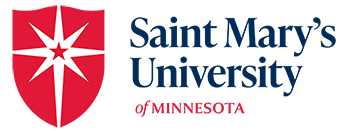Saint Mary's Newsroom
Campus ConnectionAn update from the president to alumni and parents
CDC guidance and COVID-19 university policy clarification
Over the last few weeks, there have been articles published outlining the Centers for Disease Control and Prevention (CDC) guidance for fully vaccinated individuals as it pertains to masking and social distancing. These articles were for informational purposes only. University policy regarding masking and social distancing has not changed. Due to our highly residential setting, masks and social distancing continues to be required of all students, faculty, and staff, regardless of their vaccination status. Although vaccinated individuals are less likely to become more severely ill, they can still be infected with COVID-19 and be carriers, which could quickly cause the disease to spread and affect in-person learning. Therefore, the university is erring on the side of caution to ensure the safety of our community.
COVID-19 test kits available for end of semester travel
Free saliva-based COVID-19 test kits will be available for Winona Campus students prior to travel at the end of the semester. The Centers for Disease Control and Prevention (CDC) recommends COVID-19 testing 1-3 days prior to travel.
To access free saliva-based COVID-19 testing:
- Stop by the Wellness Center to pick up your kit.
- Use a Zoom-enabled device to test at the time/location of your choice.
- Mail the test using the pre-paid UPS envelope provided for overnight shipping.
- Allow 1-2 days for results once your test has shipped.
Questions? Contact the Jay Johnson Wellness Center at 507-457-1492 or wellnesscenter@smumn.edu.
Get the facts about COVID-19 vaccines
“We [the Centers for Disease Control and Prevention (CDC)] understand that some people may be concerned about getting vaccinated now that COVID-19 vaccines are available in the United States. While more COVID-19 vaccines are being developed as quickly as possible, routine processes and procedures remain in place to ensure the safety of any vaccine that is authorized or approved for use.” Safety is a top priority and accurate vaccine information is critical.
It can be difficult to know which sources of information you can trust. Learn more about finding credible vaccine information.
GET THE FACTS from the Centers for Disease Control and Prevention (CDC). Here are some answers to frequently asked questions.
 Can a COVID-19 vaccine make me sick with COVID-19?
Can a COVID-19 vaccine make me sick with COVID-19?
No. None of the authorized and recommended COVID-19 vaccines or COVID-19 vaccines currently in development in the United States contain the live virus that causes COVID-19. This means that a COVID-19 vaccine cannot make you sick with COVID-19.
There are several different types of vaccines in development. All of them teach our immune systems how to recognize and fight the virus that causes COVID-19. Sometimes this process can cause symptoms, such as fever. These symptoms are normal and are a sign that the body is building protection against the virus that causes COVID-19. Learn more about how COVID-19 vaccines work.
It typically takes a few weeks for the body to build immunity (protection against the virus that causes COVID-19) after vaccination. That means it’s possible a person could be infected with the virus that causes COVID-19 just before or just after vaccination and still get sick. This is because the vaccine has not had enough time to provide protection.
 After getting a COVID-19 vaccine, will I test positive for COVID-19 on a viral test?
After getting a COVID-19 vaccine, will I test positive for COVID-19 on a viral test?
No. Neither the recently authorized and recommended vaccines nor the other COVID-19 vaccines currently in clinical trials in the United States can cause you to test positive on viral tests, which are used to see if you have a current infection.
If your body develops an immune response — the goal of vaccination — there is a possibility you may test positive on some antibody tests. Antibody tests indicate you had a previous infection and that you may have some level of protection against the virus. Experts are currently looking at how COVID-19 vaccination may affect antibody testing results.
 If I have already had COVID-19 and recovered, do I still need to get a COVID-19 vaccine?
If I have already had COVID-19 and recovered, do I still need to get a COVID-19 vaccine?
Yes. You should be vaccinated regardless of whether you already had COVID-19. That’s because experts do not yet know how long you are protected from getting sick again after recovering from COVID-19. Even if you have already recovered from COVID-19, it is possible — although rare — that you could be infected with the virus that causes COVID-19 again. Learn more about why getting vaccinated is a safer way to build protection than getting infected.
If you were treated for COVID-19 with monoclonal antibodies or convalescent plasma, you should wait 90 days before getting a COVID-19 vaccine. Talk to your doctor if you are unsure what treatments you received or if you have more questions about getting a COVID-19 vaccine.
Experts are still learning more about how long vaccines protect against COVID-19 in real-world conditions. The CDC will keep the public informed as new evidence becomes available.
 Will a COVID-19 vaccination protect me from getting sick with COVID-19?
Will a COVID-19 vaccination protect me from getting sick with COVID-19?
Yes. COVID-19 vaccination works by teaching your immune system how to recognize and fight the virus that causes COVID-19, and this protects you from getting sick with COVID-19.
Being protected from getting sick is important because even though many people with COVID-19 have only a mild illness, others may get a severe illness, have long-term health effects, or even die. There is no way to know how COVID-19 will affect you, even if you don’t have an increased risk of developing severe complications. Learn more about how COVID-19 vaccines work.
 Will a COVID-19 vaccine alter my DNA?
Will a COVID-19 vaccine alter my DNA?
No. COVID-19 vaccines do not change or interact with your DNA in any way.
There are currently two types of COVID-19 vaccines that have been authorized for use in the United States: messenger RNA (mRNA) vaccines and viral vector vaccines.
The Pfizer-BioNTech and Moderna vaccines are mRNA vaccines, which teach our cells how to make a protein that triggers an immune response. The mRNA from a COVID-19 vaccine never enters the nucleus of the cell, which is where our DNA is kept. This means the mRNA cannot affect or interact with our DNA in any way. Instead, COVID-19 mRNA vaccines work with the body’s natural defenses to safely develop immunity to disease. Learn more about how COVID-19 mRNA vaccines work.
Johnson & Johnson’s Janssen COVID-19 vaccine is a viral vector vaccine. Viral vector vaccines use a modified version of a different, harmless virus (the vector) to deliver important instructions to our cells to start building protection. The instructions are delivered in the form of genetic material. This material does not integrate into a person’s DNA. These instructions tell the cell to produce a harmless piece of virus that causes COVID-19. This is a spike protein and is only found on the surface of the virus that causes COVID-19. This triggers our immune system to recognize the virus that causes COVID-19 and to begin producing antibodies and activating other immune cells to fight off what it thinks is an infection. Learn more about how viral vector vaccines work.
At the end of the process, our bodies have learned how to protect against future infection from COVID-19. That immune response and the antibodies that our bodies make protect us from getting infected if the real virus enters our bodies.
 Is it safe for me to get a COVID-19 vaccine if I would like to have a baby one day?
Is it safe for me to get a COVID-19 vaccine if I would like to have a baby one day?
Yes. If you are trying to become pregnant now or want to get pregnant in the future, you may receive a COVID-19 vaccine when one is available to you.
There is currently no evidence that COVID-19 vaccination causes any problems with pregnancy, including the development of the placenta. In addition, there is no evidence that fertility problems are a side effect of any vaccine, including COVID-19 vaccines.
Like all vaccines, scientists are studying COVID-19 vaccines carefully for side effects now and will continue to study them for many years.
Call for reflection and action
Dear Saint Mary’s Community,
We at Saint Mary’s University, like the rest of the nation and the world, are emotionally reacting to Derek Chauvin being found guilty of second-degree unintentional murder, third-degree murder, and second-degree manslaughter in the death of George Floyd. As a Lasallian Catholic University, we are called to advocate for justice, particularly for those historically marginalized and silenced, including Black citizens.
The university encourages the entire community to peacefully reflect on this verdict in memory of George Floyd, which is consistent with the wishes of his family. Winona Campus students are reminded that the Jay Johnson Wellness Center is available for support. As emotions run high, we ask all of you to be especially kind to one another; this is a difficult time for everyone. Saint Mary’s supports each other and all who have been treated unjustly.
I invite your prayers for our community, our state, and the entire nation. We know that conversations and actions must continue to address racial injustice on a university, state, and national level.
In peace,
![]()
Rev. James P. Burns, IVD, Ph.D., President
COVID-19 vaccinations not mandated for fall 2021
After much careful thought and deliberation, Saint Mary’s University of Minnesota will not require mandatory COVID-19 vaccinations for fall 2021. All current COVID-19 vaccinations have been approved under an Emergency Authorization by the Food and Drug Administration. That authorization gives any individual the right to decline the vaccination. As such, the university does not believe that vaccinations may be mandated for students or employees. However, if the state or federal government mandates COVID-19 vaccinations, we will comply with the mandate.
The university strongly encourages all individuals to get vaccinated if they are able to do so. The university also encourages students at the College to add their vaccination status to the student health portal. In the fall, the university will follow all guidelines in force at that time and will set expectations for quarantining and testing for those who choose not to be vaccinated.

Sports Hall of Fame Class of 2021 to be inducted April 24
The Saint Mary’s University Athletic Department, in association with the Saint Mary’s Alumni Association, will proudly induct four former student-athletes into the Saint Mary’s Sports Hall of Fame: Barb (Bock) Loahr ’87, Doug Loahr ’87, Andrew Brueggen ’11, and Jackie Huegel ’03, as well as longtime sports information director Donny Nadeau ’85. The five will be recognized virtually at 7 p.m. on Saturday, April 24.
School of Business and Technology expands badge offerings
At the start of the year, Saint Mary’s partnered with Credly, an industry leader in digital credentials, to provide students with 27 industry-specific micro-credentials tied to in-demand skills in artificial intelligence, business analytics, healthcare analytics, human resource management, finance and project management.
These credentials have become valuable additions to our students’ professional portfolios:
“So excited the Business Intelligence and Data Analytics program at Saint Mary’s University of Minnesota now includes badges for us to share our learnings!” — Sophie Kliendl, Schools of Graduate and Professional Programs
Over 600 credentials have been accepted and shared throughout professional and social media networks in the School of Business and Technology so far!
Building on the success of this initial offering, the School of Business and Technology is proud to announce the launch of an additional 14 distinct micro-credentials, beginning in spring second semester, tied to graduate courses and certificates in three additional high-demand fields:
- Data engineering
- DIGA 608, DIGA 610, DIGA 620, DIGA 625, DIGA 650
- Geographic information science
- DIGA 605, DIGA 610, DIGA 615, DIGA 625, DIGA 630
- Accounting
- ACCT 600, ACCT 610, ACCT 630, ACCT 670
We will automatically be issuing badges to students who have successfully completed badged courses beginning in fall 2020 up to the present spring second semester term.
See the complete list of our 41 course badge offerings
If you have successfully completed a badged course prior to fall 2020 and would like to receive the corresponding badge(s), you can complete this request form.
Once again, we are thrilled by the energy and enthusiasm you have shown regarding badges and micro-credentials. We look forward to continuing the work to identify and recognize skills-based achievement across the university, helping to ensure that our students are among the most well-prepared to meet the challenges of tomorrow.
To learn more about digital badges and micro-credentials at Saint Mary’s University, please visit smumn.edu/badges.
RSVP for ‘A Seat at the Table’
We would like to invite you to join us on Thursday, May 20, for the first conversation in the new Saint Mary’s series, A Seat at the Table. A Seat at the Table aims to bring together Saint Mary’s Schools of Graduate and Professional Programs to talk through topics affecting our students and community. Our conversation on May 20 will be “COVID-19 and Anxiety: One Year Later.”
We welcome you to join us virtually that evening from 6:30 to 8 p.m. and listen to a conversation with students and faculty from the School of Health and Human Services.
To RSVP for the event, complete this form by Wednesday, May 12. We will leave time for student questions toward the end of the evening. If there are any questions you would like to ask related to COVID-19 or mental health, please include them in the question section of the form.
Should you have any questions, please email aseatatthetable@smumn.edu.
We look forward to seeing you there!
In the news
Brother Robert Smith, FSC, Ph.D., senior vice president for university initiatives and special advisor to the president, was interviewed on regional Catholic radio about Blessed James Miller.
KTTC TV featured a story about what regional campus policies are regarding vaccinations.
The Winona Daily News featured an article about the three higher education institutions working through pandemic changes and also featured an editorial from Father Burns.
The Winona Post featured Saint Mary’s fall back-to-school plans.



